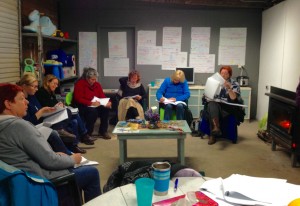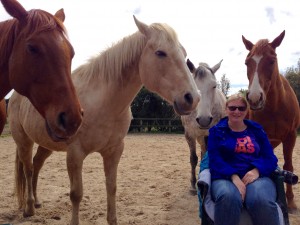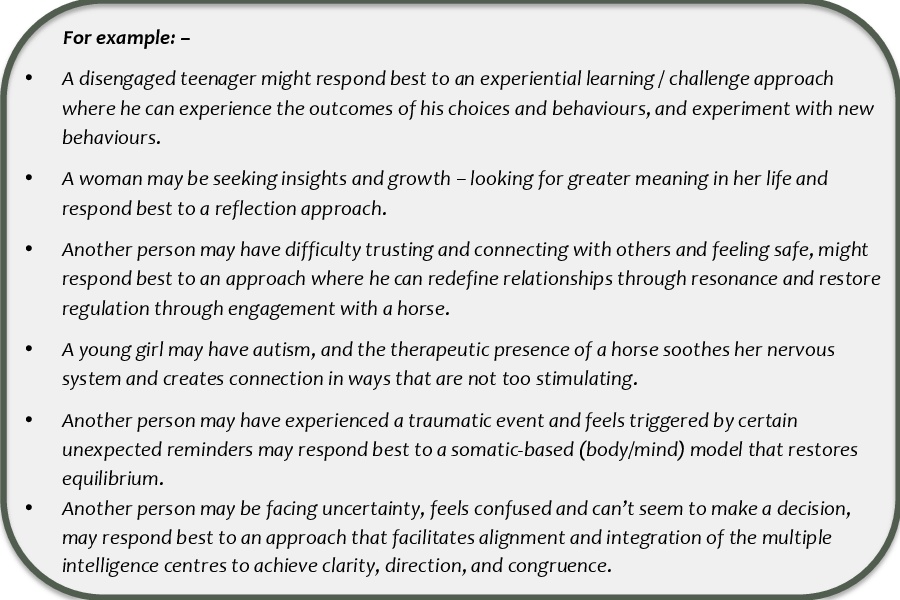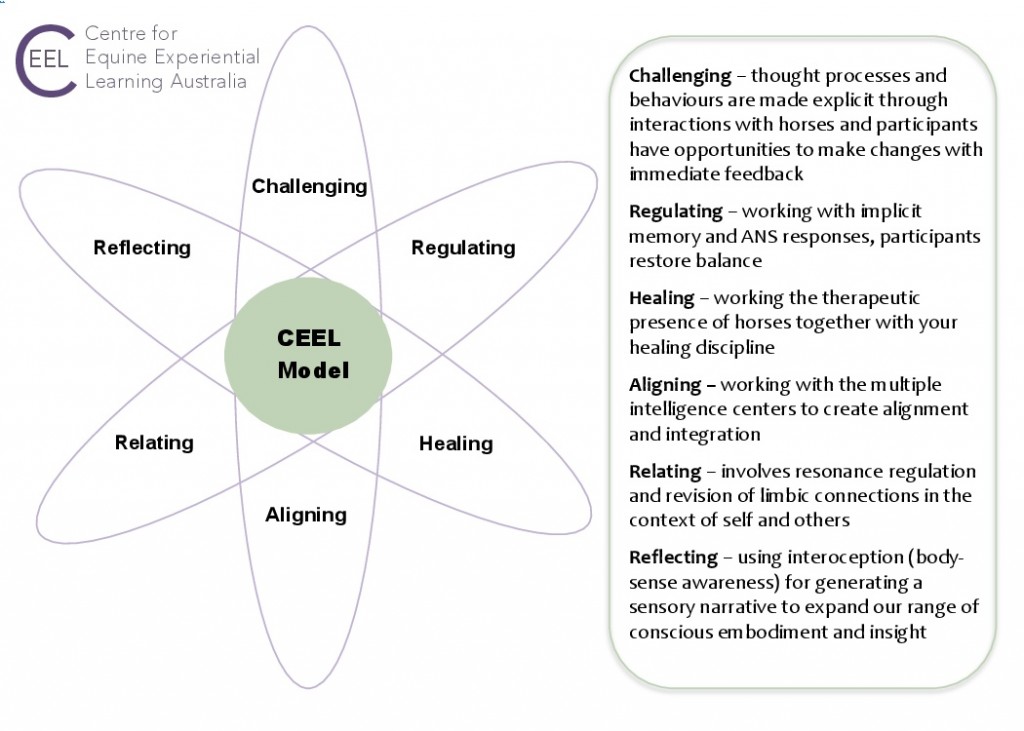**Next training dates**
Training consists of the following 4 modules that need to be completed in order:
*FOUNDATION Training October 11-14, 2024
* Working with Individuals BEGINNER November 29-Decemver 2, 2024
* Working with Individuals INTERMEDIATE January 17-20, 2025
* Working with Individuals ADVANCED March 14-17, 2025
Location: 150 Larcombes Road, Modewarre
Send an email to cindy@centreforeel.com for an application
10 Reasons to consider CEEL for your equine practitioner training
1. Over 65% of the training is practice under the guidance of an experienced practitioner/training assistant (ratio of trainers : participants is 1:3)
You will be fully prepared to confidently and competently work with clients.
2. You will grow exponentially – CEEL training is life changing
Many participants share how they have made positive changes in their lives, careers, and relationships after attending CEEL training, and even share that their spouses/partners are fully supportive.
3. A spiritual component (that is excluded from most trainings and mental health qualifications) and yet necessary for the client to move beyond trauma, is integral to the CEEL training
Trauma is considered the gateway to spiritual growth. Drawing on the wisdom / creating connection with one’s higher self is often necessary for complete healing and recovery from trauma.
4. Working with the Universal Laws of energy helps your work to be precise and appropriate
Universal Laws of energy is a key principle when clearing trauma and the energies of unprocessed emotions, and survival patterns.
5. Your CEEL trainer shares insights and experience only acquired by working with clients every day for over 15 years
This fast tracks your learning, helps you avoid pit falls, and choose proven strategies
6. All training is face-to-face / in person
You will experience many different nervous systems, ‘real time’ support from trainers, and containment, co-regulation, and authentic responses from a herd of horses – all essential for effective learning, that you would not get through distance learning.
7. The skills you learn will enable you to work without horses (if you wish) for greater flexibility
The skills you learn are ‘stand-alone’ and while the processes are supported and amplified by the horses, you can work with other supports such as being in nature, or including other animals, or on your own – especially if you need to do some distance work.
8. There is a continuous learning pathway
Graduates of the CEEL training are eligible to attend further professional training modules such as:
- Working with children
- Working with groups
- Working with ancestral / past life trauma
- Masterclass
9. You will become a member of a cohesive and supportive community
Supportive relationships within the CEEL community are forged through participants’ shared experiences, and continue to stay connected, meet up, and sometimes run programs together. A private facebook group is used regularly to share ideas, ask questions, offer encouragement etc.
10. You are encouraged and supported to integrate the CEEL approach with your unique offering and expertise
When you make it your own will you be able to stand apart and draw your ideal clients.
z—————————z——————————–
Over the past 30 years equine facilitated learning, counselling, coaching and therapy has evolved significantly. With the teachings of the Polyvagal Theory, neuroscience, and trauma research, equine programs have become more precise and effective.
With over 15 years’ experience working with clients daily, CEEL training can fast-track participants’ learning, growth, and skills development by teaching proven processes that will enable them to avoid potential pitfalls, develop confidence, and successfully establish their own practice.
The CEEL model is:
- resolves trauma (not just trauma-informed)
- somatic-based
- soul-focused
- aligned with the principles of physics and energy, and
- enhanced by the participation of horses who to show us the way to live in the flow of life – to be in tune with our bodies, and authentically responsive.
The CEEL model is ‘elegant’ in its simplicity, profound in its depth, and powerful in its capacity to facilitate a return to well-being on all levels – physical, mental, emotional, and spiritual.
While it may seem that everyone’s challenges are unique, we have identified predictable response patterns, and in particular, the body’s innate drive to seek equilibrium – which has reliable, predictable patterns.
We are guided by these patterns and work with the impulses, movements, energies, and wisdom of the body to resolve trauma, adverse events, pain, unprocessed emotions, self-limiting beliefs and resulting mental and physical conditions and disorders – to help clients return to their natural state of well-being.
“The path of direct revelation unfolds by way of the human body” ~ Matt Licatta
Only when the body feels safe, will it release discordant energies of stress, trauma, and pain. Here is where the horses are integral to our work – through co-regulation, stimulation, shifting energy, and clearing energy blocks, their therapeutic presence provides a powerful energy field that creates a profound feeling of safety.
“One way to get people back out of dissociation, aka freeze — aka trauma, is to surround them with friendly mammals, and stimulate their mammalian social engagement systems to come back on line.” ~ Stephen Porges
The energies of trauma – unresolved events, and unprocessed emotions, limits our life experiences and the full expression of who we are and why we are here – this directly affects our spiritual growth and evolution. Our holistic approach engages the wisdom and guidance of the soul/higher self to help clients experience empowerment, safety, and greater alignment.
Commitment to our own growth and evolution
With horses, we cannot ‘fake it till we make it.’ They would respond to this with agitation – a response we all experience when something someone is saying/doing doesn’t feel right. Essentially, they do not feel safe with us. As facilitators, we have to be acutely self-aware, and own our adverse responses (e.g. triggers, judgements, reactions) so that we are aligned and congruent. During the CEEL facilitator training, participants explore and clear these discordant energies (from past adverse experiences), and learn processes to keep their bodies clear.
We use our own bodies to track and sense our clients’ somatic experiences. CEEL participants learn to listen to their clients with their own bodies. This attunement is highly supportive and can be a healing experience in itself. It also enables us to ask helpful questions and guide clients’ experiences with greater accuracy.
CEEL provides a true paradigm shift
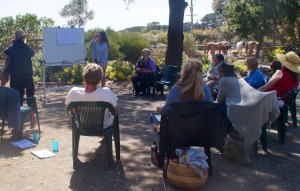 The Centre for Equine Experiential Learning (CEEL) model can be distinguished by it’s focus on the felt sense of safety. This coherent state is what allows a person to function effectively as a whole. Supporting clients to move toward coherence helps establish more stability and greater capacity to negotiate challenges. From this ‘resourced’ perspective, beneficial change, healing, insights, solutions and clarity arise organically.
The Centre for Equine Experiential Learning (CEEL) model can be distinguished by it’s focus on the felt sense of safety. This coherent state is what allows a person to function effectively as a whole. Supporting clients to move toward coherence helps establish more stability and greater capacity to negotiate challenges. From this ‘resourced’ perspective, beneficial change, healing, insights, solutions and clarity arise organically.
CEEL teaches participants to observe the physical and emotional states of their clients and employ a ‘shepherding style’ of facilitation that aligns them with their naturally occurring trend towards increased coherence and well-being.
CEEL teaches how resolution and healing happens from within the autonomic nervous system and makes it possible to imagine freedom from discomfort, and for living an authentic, vibrant life in the here-and-now.
CEEL can also be distinguished by its:
- Attendance to the autonomic nervous system – the stress response system. It influences all the other systems in the body – specifically the cardiac, respiratory, digestion and brain. When the nervous system is not coherent (i.e. dysregulated), it causes disruption in these and other systems. In this state, the thinking brain is compromised, and problems cannot be solved.
- Observance of neuroplasticity and how certain, timely interventions can support new, more beneficial patterns of thoughts, beliefs, and behaviours
- Recognition of the horses’ contributions to achieve coherence, and work in ways that are yet inexplicable by conventional science
- Recognition that the horses are truly equal – where their needs matter as much as the humans’ and are treated accordingly – outside as well as inside the client sessions
- Understanding that everything is energy – which leads to interventions that effect beneficial shifts in thinking, emotions, beliefs, habits, and behaviours
- Acknowledgment of the metaphysical realm and one’s capacity to experience non-ordinary states
CEEL is also:
- Experiential – where one engages with the horses and reflects on the interaction
- Somatic – where attention is drawn to one’s body and its responses and shifts
- Trauma-sensitive – where care is taken to keep clients within their ‘window of tolerance’ while skillfully expanding their capacity for resilience and emotional regulation
- Spiritually oriented – towards alignment with our higher selves
- Energy fluent – recognizing that everything is energy and that consciousness causes energy to change
Five areas of competency
CEEL identifies the main areas of competency required to skillfully and effectively run equine experiential learning (EEL) programs and help you develop these competencies in our training program. Learning EEL is not linear – that is, it is not a straightforward process where one skill builds on another. Rather, all of the competencies and skills required are interdependent – as illustrated in the diagram below.
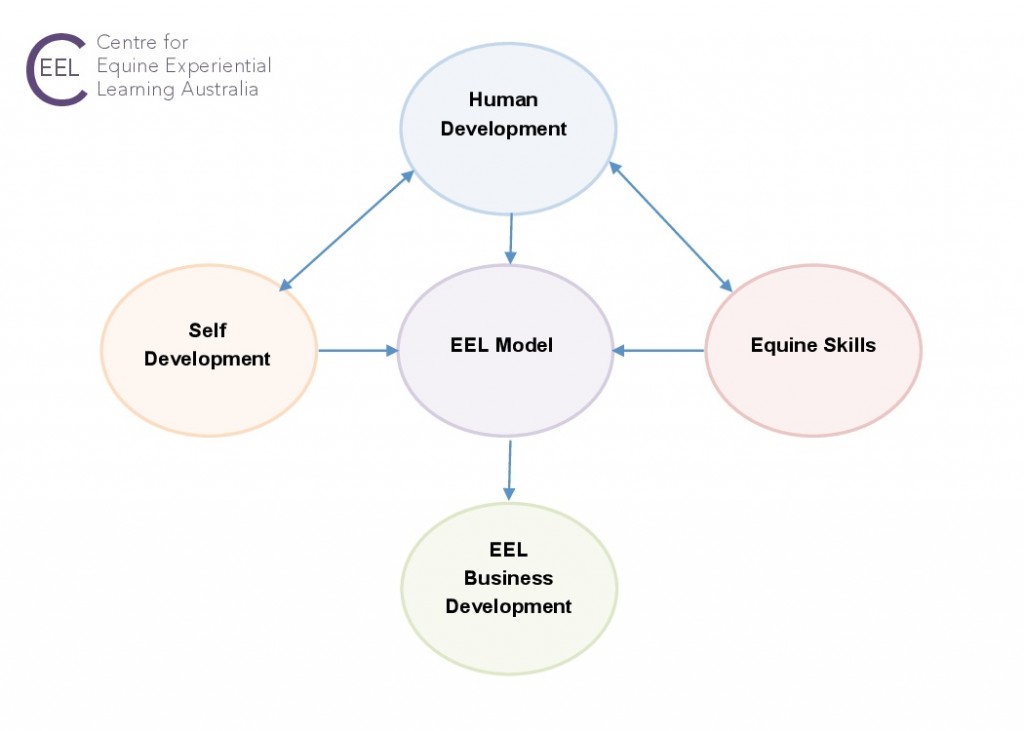 Competency in facilitating equine experiential learning involves attaining proficiency in five key areas:
Competency in facilitating equine experiential learning involves attaining proficiency in five key areas:
- Human development – how to observe relevant client behaviors according to a clear map that allows practitioners to understand the nervous system state, and reveals what kind of intervention is most likely to support natural reorganisation. Practitioners learn specific facilitation skills to ‘shepherd’ clients towards increased coherence and reslilience.
- Equine skills – includes horse psychology and horse-relationship and management skills, and specifically how to work with horses in this modality and recognise their contributions
- The CEEL model - includes the underpinning philosophy and guiding principles
- Self development – includes continuing personal growth and how this manifests in your facilitation
- Business development – Integrating your distinct orientation and expertise with the CEEL model to develop your unique business
The CEEL approach
we are required to be responsible stewards on many levels.”
~ Leigh Shambo, The Limbic Path: Beyond Office Therapy
Not a ‘one size fits all’
Once safety and coherence is established, clients are ready to move into deeper work with a greater capacity for resilience. Since humans are complex beings, when it comes to learning, healing, growth, or transformation, one size doesn’t fit all. As facilitators, we need to adapt to the client’s specific needs and select a process that is most appropriate.
Underpinning all of these processes is the understanding that everything is energy, vibration, and frequency. Drawing attention to these helps clients recognise and change patterns of beliefs, thoughts, and behaviours.
The CEEL Model
The CEEL Model – distinguished by its attendance to safety, coherence and resilience, and defined by its guiding principles – identifies six key processes for working with clients. Within each of these processes is scope to further define the approach for certain clients and integrate the facilitators’ orientation, learning and life experiences.
Body-centred, presence-based coaching
Horses are fully embodied and live in the present moment, so it makes sense to use a body-centred, presence-based coaching approach. CEEL teaches you to be adaptive experiential facilitators for your clients to make sustainable, beneficial change. The role of a CEEL facilitator is to assist and empower each client to more fully embody his or her authentic self while being in relationship with others through partnership with a horse(s).
More than a technique
CEEL facilitation is more than a technique; it is a way of being – in and out of the arena. Since horses are highly sensitive, relational beings, we need to be fully aware of what we are ‘holding’ and what we bring into the horses’ space. In a clinical setting it might be acceptable to ‘bracket’ our unresolved issues (e.g. where we ‘park’ the issue until later), but when we include horses, we have to apply to ourselves the same processes that we facilitate with our clients – and continually regulate ourselves in order to be fully and energetically present.
In the CEEL community you are not alone
When you attend CEEL training, you automatically become a member of the growing, mutually supportive and resourceful CEEL community where knowledge and experience is readily shared, and creative solutions to challenges are explored. You can call on the CEEL community for ideas, suggestions, and feedback to your questions and challenges, and learn about others’ experiences.

